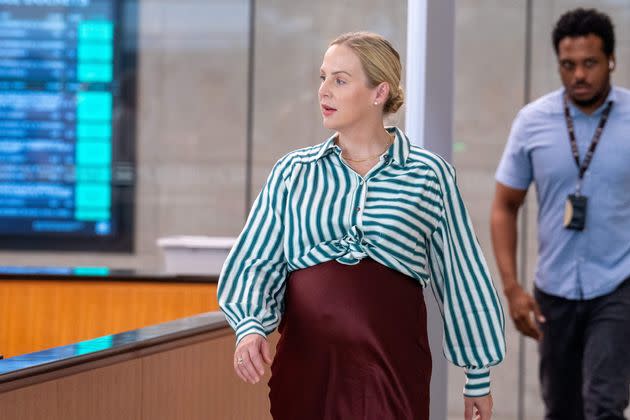Texas OB-GYN: Abortion Law Means My Pregnancy ‘Belonged To The State’
AUSTIN, Texas ― Dr. Austin Dennard, a Texas obstetrician-gynecologist, testified Thursday that her experience with her state’s strict anti-abortion regulations made her feel powerless during her own difficult pregnancy as a hearing in opposition to the law entered its second day.
“I felt like my pregnancy was not my own — that it belonged to the state — because I no longer had a choice in what I could do,” Dennard testified.
“I felt abandoned,” she said. “I couldn’t believe that having spent my entire life in this state, being a fifth-generation Texan, practicing medicine in this state, the state had completely turned its back on me.”
Dennard joined the group of women suing the state of Texas over its abortion laws after the original suit was filed in March with backing from the Center for Reproductive Rights. The group of 13 women and two physicians hopes ultimately to clarify precisely when abortion may be provided to pregnant patients in Texas; in the meantime, they want Travis County Judge Jessica Mangrum to issue a temporary injunction against the law.
The women take particular issue with the medical exception built into Texas’ abortion bans, which allows for abortion where the pregnant patient’s life is in danger. How endangered the patient’s life needs to be is not specified, and the law makes no mention of the physician’s good-faith judgment.
Dennard, a mother of two, learned she was pregnant again last summer. Given her medical expertise, she recalled seeing the scan that revealed her fetus was missing a properly developed skull.
“The mother in me was hoping the physician in me was second-guessing what I saw. But I knew then that this was not going to be a brother or sister for my children,” Dennard said through tears.

Austin Dennard, an OB-GYN who had to travel out of state to get an abortion for a nonviable pregnancy, arrives Thursday at the Travis County Courthouse in Austin, Texas. Zurawski v. State of Texas, a lawsuit filed by the Center for Reproductive Rights on behalf of 13 women denied abortions despite serious pregnancy complications, seeks an injunction against the state law.
She testified that women in her situation are at risk of life-threatening complications, and the standard of care is to allow the patient to decide whether to continue with the pregnancy or end it.
Several of her co-plaintiffs had provided devastating testimony on Wednesday about their individual experiences being denied abortion care in Texas.
Attorneys for the state suggested that they had simply received bad medical advice, pointing out that defendants like suspended Texas Attorney General Ken Paxton did not personally deny the women an abortion.
On Thursday, state attorney Amy Pletscher asked Dennard whether she had consulted Paxton with regard to her troubled fetus.
Dennard quipped: “You know, I never thought to ask him.”
Pletscher also received a snappy reply to a question referring to Dennard’s pregnancy as “geriatric.”
“Well that’s a nice word,” Dennard said. Pletscher apologized, but repeated her question with similar phrasing.
“Geriatric is not a medical term,” Dennard told her. (The phrase “geriatric pregnancy” is meant to refer to patients who are pregnant over the age of 35, as health risks in pregnancy generally increase with age, but they vary widely by person.)
Pletscher pointed to a singular case, a child named Jaxon Emmett Buell, who survived from 2014 to 2020 while missing most of his brain. Attorneys for the state similarly asked plaintiffs on Wednesday whether they knew of such cases.
Generally, however, children born with anencephaly or acrania can only be expected to live a short while after birth, during which time they struggle to breathe. One woman vomited on the stand Wednesday as she recalled the trauma of remaining pregnant with a fetus diagnosed with anencephaly.
An expert witness called by the state, Dr. Ingrid Skop, who is affiliated with the anti-abortion Charlotte Lozier Institute, saw little problem with forcing women to carry such pregnancies to term. Holding a dead infant could “improve the grief” process for parents and even young children, she suggested.
“It’s heartbreaking, but it’s beautiful, too,” Skop said.
Dennard eventually left Texas to obtain an abortion on the West Coast.
Two expert witnesses called by the plaintiffs testified earlier in the day that abortion law in the state of Texas is not well written and ends up causing harm.
“Generally, my opinion is the laws as they’re currently written, the medical exceptions, they’re confusing. And that confusion, that lack of clarity, is keeping clinicians from exercising their good faith clinical judgment,” said Dr. Ali Raja, the executive vice chair of emergency medicine at Massachusetts General Hospital. He added that “the consequences of those laws are severe.”
Physicians who misinterpret the law face steep financial penalties, jail time and the loss of their medical licenses.
“They’re going to err on the side of not treating,” Raja testified.
Judge Mangrum is expected to issue a decision on the plaintiff’s request for a temporary injunction and the defendants’ request to dismiss the case in the coming weeks.
